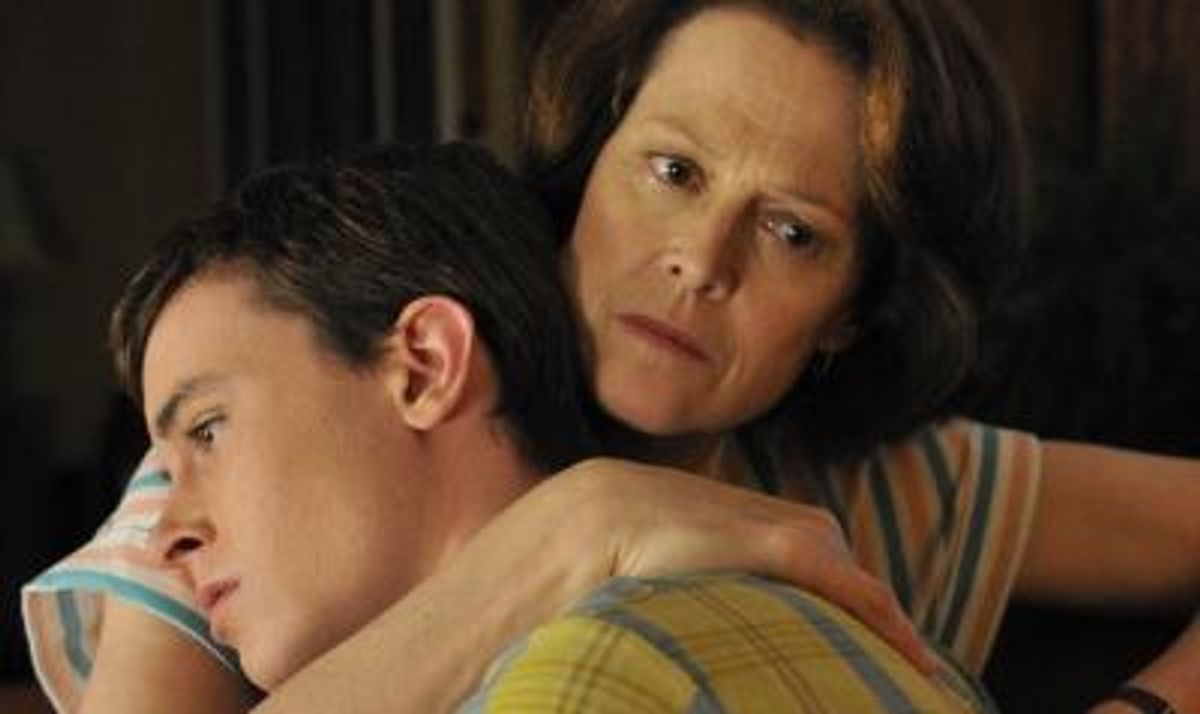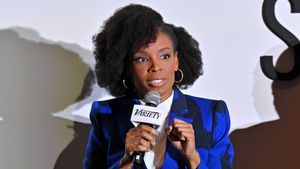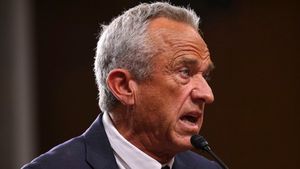Photo: Ben Mark Holzberg for Lifetime Television
When Prayers for Bobby was originally released on Lifetime in 2009, it found a huge audience (an estimated 17 million American households the first weekend) that related to its message about what intolerance can do to a family and a mother's quest to seek understanding and forgiveness after the suicide of her gay son.
Based on the book of the same name, the story focuses Bobby Griffith's death in 1983 after coming out to his family as gay. In today's political and social climate, the deeper message about love and understanding directed at parents still rings true, especially how we see Bobby's mother, Mary Griffith (played by Sigourney Weaver). Her evolution from crisis of faith to her eventual full-throttled support of PFLAG (Parents, Families, and Friends of Lesbians and Gays) on her mission to save other LGBT children from the same tragic fate is inspiring.
Weaver's powerful, emotive performance binds the film, keeping the it from teetering into complete sentimentality (although it's still quite a tearjerker). Beginning today, Prayers For Bobby is now available on DVD and will receive a global push to reach more communities and help more families and young people (for more information click here). A screening took place on National Coming Out Day, October 11, in New York City, and Weaver was on hand to discuss the impact of the film before her weekend at New York Comic-Con to promote Exodus, her next sci-fi film directed by Ridley Scott. She opened up on a variety of topics, including Putin as dictator, why the country seems to not being making enough progress concerning gay rights, and what it was like to play a housewife for the first time in her career.
On whether the country and the world is more enlightened now:
I think that there hasn't been as much movement as one would expect. Our country is so polarized in so many ways, especially this issue. Parts of this country are really digging in. This is the big battle, and I'm afraid it has not changed. That's why the Pope saying, 'Let's love each other,' was so profound. He needs to go talk to Congress.
On how playing Mary Griffith fits into her acting career:
You know, I am a mother; I have a lovely 23-year-old girl. I'm not often sent mother parts. I'm usually, who knows: Secretary of State, an astronaut. I just played an Egyptian queen for Ridley Scott [in Exodus]. I'm never, ever asked to play anyone who is a housewife. I was so grateful to be asked to do this; it seemed impossible to me at the time. I was so grateful to play a woman, who had children, who lived in a house, in a community. Because I think that's the stuff of life, and you can only do so much fantasy, history, and whatever.
On learning to understand Mary:
I didn't know how I could find my way into her world. I was brought up in New York, my parents were atheists. I thought, I don't know how to get to that planet. Of course I managed to get there. Honestly, when you meet Mary and see or hear her story, you feel, We can do it. You think, Everything will change. But will it happen fast enough? You can't leave that house, with Mary and Bobby's siblings, without wanting that to never happen to any other family again because it just doesn't go away.
On Russia and whether we should boycott the Sochi Olympics:
I'm incredibly surprised by the way that Putin is digging in and becoming a real dictator. He was a sort of secret dictator and now, with everything's he's done, it's radical, it's such a frightening time. It's happening right in front of us. It's hard for me to believe that there's nothing the world can't do to save those girls [Pussy Riot] and young people. It's crazy for have someone say: "You can't be YOU in this country." I think it's very hard to say to these young people who've trained so hard that we should boycott the Olympics. But I think it's an excellent opportunity to make it clear how the world thinks about this. I think the Olympics may be a great way for some, without trying to be shocking, but trying to be exuberant and show the world what it means to be gay: How can you resist that?
 On how parents need to learn to respect their children:
On how parents need to learn to respect their children:
I think the message of the film is: Listen and have respect for your child. It's a lesson mothers and fathers learn every day, to conquer your fear for your child. We all want them to grow up in little bubbles, but you have to restrain that impulse you had when they were little. And you have to trust them and let them go and trust that they will come to you, maybe. But you have to trust in their instincts about things. It doesn't have to be gay or anything. They are going to go off to wherever. That's the part of parenthood that they don't tell you about. You can't keep them on a leash.
A wonderful fan of mine I met in New Zealand, who had five children who had moved all over, explained it to me like this: "They're all over, but it's as if we're climbing a mountain and we're all on a rope. And I just let out more rope, but they're still connected to me." I thought that was a very good metaphor.
On why she decided to take on such a heartbreaking role and tether herself to this cause:
I think I was anyway. I know that when I go to GLAAD events and Comic-Con, there are all these great kids. They have so much going for them, especially when they are trying to figure out who they are. They are so vulnerable, the last thing anyone should be doing is making them feel bad for what or who they are. My god, they need so much support.
On gorillas being more evolved than humans in so many ways:
The fact that it's all still wrapped up in religion and shame, I'm very impatient with our species. I don't think gorillas in the wild do this. They are superior to us in every way. Chimps I don't know, they are always at each other for something. In the wild, what happens? Because I feel we have so many things to learn from other species. Maybe because our brains are big and we have thumbs, we stay up here [pointing to head] instead of down here [pointing to chest].
On watching films on personal technology devices vs. the big screen:
I absolutely support watching things that way. Is it the best way to watch Lawrence of Arabia on your iPhone? Maybe not. But that's absolutely right: It becomes a different thing, it becomes YOUR movie. You can watch it anywhere, your story. I think it's great. I think certain movies--like Avatar and Exodus--you should watch on the screen first! Because so much work has gone into the visuals.
But that's why we wanted to do Prayers for Bobby on TV first, because it's mainlined right into the hearts and the households. That's why TV is so powerful. I don't know why media can't do more. We certainly have gay characteres on TV, but it doesn't seem to make a difference to those kids who came up to me after [my broadway show] in New York. They had come along way. It's still New York and other cities that are a refuge. How do we expand New York? It's not going to happen in this political climate.
For information on Prayers for Bobby, visit the website.


































 On how parents need to learn to respect their children:
On how parents need to learn to respect their children:






















































